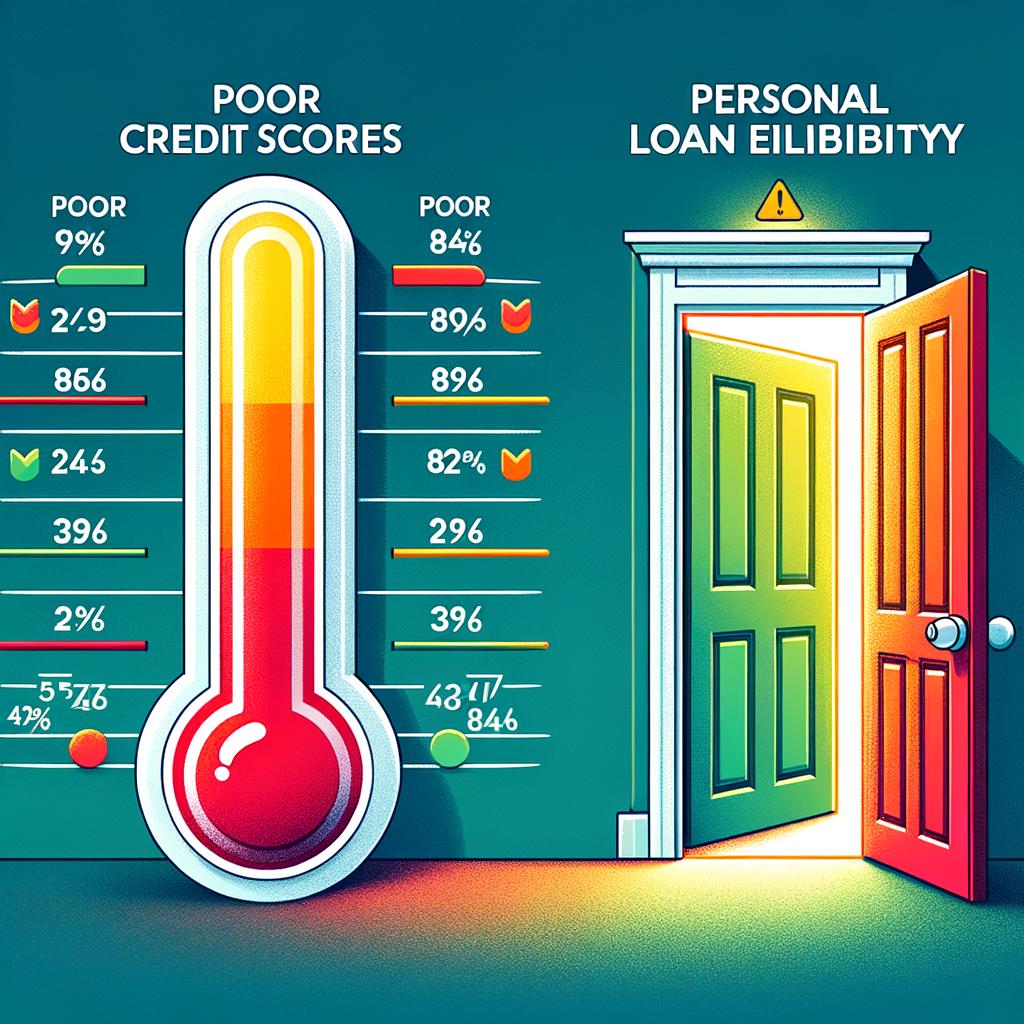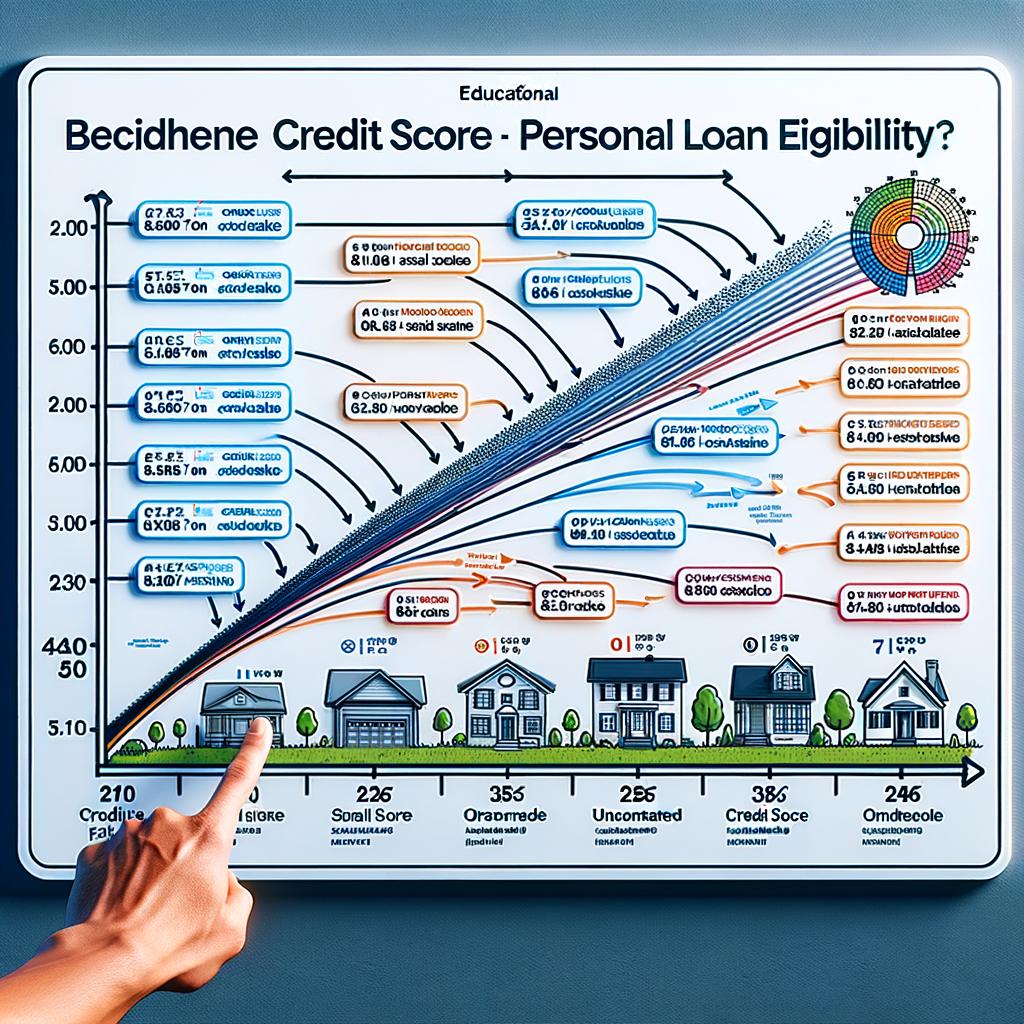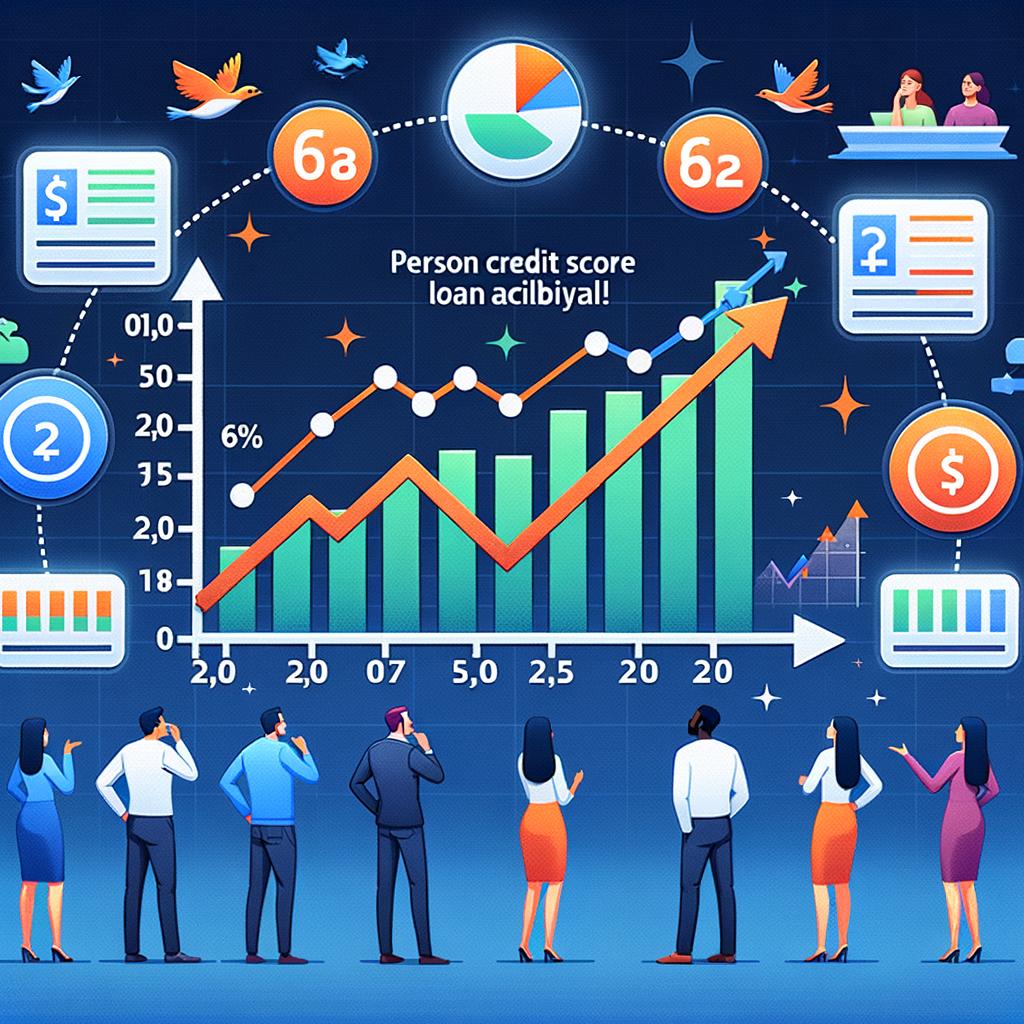In the complex world of personal finance, credit scores often take center stage, wielding the power to unlock doors or, conversely, keep them firmly shut. Imagine a credit score as a silent judge, meticulously weighing every financial decision you’ve ever made, and then declaring whether or not you’re deemed worthy of financial trust. This silent yet potent force can make or break your dreams of securing a personal loan, dictating the terms, interest rates, and even your overall eligibility. But fret not, for this article will serve as your guide through the labyrinth of credit scores and personal loan eligibility, demystifying the numbers and illuminating the path to financial empowerment. Join us as we unravel the intricate dance between your credit history and your borrowing future, transforming daunting complexity into manageable clarity.
Table of Contents
- Understanding the Connection Between Credit Scores and Loan Approval
- The Impact of Credit Scores on Interest Rates and Loan Terms
- Strategies for Improving Your Credit Score for Better Loan Opportunities
- Navigating Personal Loans with a Low Credit Score
- Q&A
- Wrapping Up

Understanding the Connection Between Credit Scores and Loan Approval
A credit score is more than just a number; it’s a snapshot of your financial health that lenders scrutinize closely. Understanding how this score links to loan approval can help you navigate the often-complex world of personal loans.
Lenders use credit scores to assess the risk of lending money to you. A higher score typically suggests you’re financially responsible and have a history of paying back what you owe on time. In contrast, a lower score might indicate missed payments or high levels of debt, raising red flags for potential lenders.
Factors Influencing Credit Scores:
- Payment History: Timeliness of bill payments.
- Credit Utilization: Ratio of your current debt to your total credit limit.
- Length of Credit History: How long you’ve had open credit accounts.
- Types of Credit: A mix of credit types, such as credit cards and installment loans.
- New Credit: Number of recently opened accounts and credit inquiries.
When a lender reviews your personal loan application, they don’t just look at the score itself. They also consider the underlying factors that contribute to it. For instance, a borrower with a good score due to long credit history but with recent multiple inquiries might still face challenges.
Lenders often categorize applicants based on their credit scores:
| Credit Score Range | Rating | Loan Approval Likelihood |
|---|---|---|
| 750-850 | Excellent | Very High |
| 700-749 | Good | High |
| 650-699 | Fair | Moderate |
| 600-649 | Poor | Low |
| Below 600 | Very Poor | Very Low |
Besides the credit score, lenders will further analyze your debt-to-income ratio, current employment status, and overall financial stability. Even if your score falls into the “Fair” or “Poor” categories, demonstrating a steady income and manageable debt levels can tilt things in your favor.
The intersection of credit scores and loan approval is a dynamic one. It reflects not only your financial decisions but also the lender’s criteria and market conditions. Each lender has a unique approach, and what one regards as a red flag, another might overlook.
Improving your credit score is a long-term game, but the effort pays off. Simple steps like timely payments, reducing outstanding balances, and regularly checking your credit report for errors can significantly impact your eligibility for better loan terms.

The Impact of Credit Scores on Interest Rates and Loan Terms
One of the most significant factors influencing your ability to secure a personal loan, as well as the terms of that loan, is your credit score. This crucial number plays a pivotal role in the interest rates you’re offered and the overall loan terms you can expect. Understanding how credit scores impact these elements can empower you to make smarter financial decisions.
Interest Rates
Your credit score directly affects the interest rate you’ll be offered on a personal loan. Generally, higher credit scores result in lower interest rates. This is because lenders perceive applicants with higher scores as lower-risk borrowers. The difference in interest rates can be substantial, translating to significant savings over the life of the loan. Consider the following example:
| Credit Score Range | Interest Rate |
|---|---|
| 720-850 | 5% - 10% |
| 690-719 | 10% – 14% |
| 630-689 | 15% – 19% |
| 300-629 | 20% – 30% |
As shown above, maintaining a high credit score can potentially save you hundreds or even thousands of dollars in interest payments.
Loan Terms
In addition to affecting interest rates, your credit score also influences the terms of your loan. Borrowers with excellent credit scores often receive more favorable loan terms, such as longer repayment periods and higher loan amounts. On the other hand, if your credit score is lower, lenders may impose stricter conditions, including:
- Shorter repayment periods
- Higher monthly payments
- Lower loan amounts
- Additional fees or penalties
Eligibility for Loan Benefits
Often, lenders offer special benefits or incentives to borrowers with excellent credit scores. These can include pre-qualification for loan offers without a hard credit check, waiving of certain fees, or offering flexible repayment options. Such perks make the overall borrowing experience more pleasant and less costly.
Credit Score Tiers and Perceptions
Lenders categorize credit scores into different tiers, and these tiers shape their perceptions of risk. Each tier corresponds to a level of risk, influencing their decision-making process. Here’s a straightforward breakdown:
| Credit Score Tier | Lender Perception |
|---|---|
| Excellent (800-850) | Very Low Risk |
| Good (740-799) | Low Risk |
| Fair (670-739) | Moderate Risk |
| Poor (300-669) | High Risk |
These perceptions directly influence not just interest rates, but also approval likelihood and additional conditions attached to the loan.
Proactive Measures to Improve Credit Scores
If you’re looking to enhance your credit score to secure better loan terms, there are proactive steps you can take. These may include:
- Regularly checking your credit report for inaccuracies
- Paying bills on time
- Reducing outstanding debt
- Avoiding new credit inquiries before applying for a loan
By taking control of your credit score, you can position yourself more favorably in the eyes of lenders, ensuring access to the best possible loan terms.

Strategies for Improving Your Credit Score for Better Loan Opportunities
Understanding how to improve your credit score is crucial for unlocking better loan opportunities. Here are some practical strategies to guide you toward a healthier credit profile.
Regularly Check Your Credit Report
It’s essential to know where you stand by checking your credit report regularly. Errors on your report can drag down your score, so make it a habit to review and dispute inaccuracies. Utilize annual free credit report offerings from major credit bureaus.
Pay Your Bills on Time
One of the most significant factors affecting your credit score is your payment history. Late payments can significantly harm your credit score, so always pay your bills on time. Setting up automatic payments is a great way to ensure you never miss a due date.
Reduce Your Outstanding Debt
If you’re carrying high balances on your credit cards, try to pay down your debt as quickly as possible. A lower credit utilization ratio, which is the amount of credit you’re using compared to your credit limit, will positively impact your credit score.
- Keep balances low on credit cards
- Consolidate multiple credit accounts
- Use available credit sparingly
Build a Positive Credit History
Sometimes, improving your credit score means starting from scratch. If you’re new to credit or rebuilding, consider taking small, smart steps:
- Open a secured credit card
- Use credit-building loans
- Become an authorized user on a family member’s account
Manage New Credit Requests
Each time you apply for new credit, it results in a hard inquiry, which can temporarily reduce your credit score. To avoid this, be strategic about when and how often you apply for new credit.
Maintain Older Credit Accounts
The length of your credit history makes up about 15% of your credit score. Closing old accounts, especially if they have a positive payment history, can reduce your average credit age and negatively impact your score. Keep old accounts open and active whenever possible.
Monitor Credit Utilization Ratio
A high credit utilization ratio indicates you are highly dependent on borrowed money, which can be a risk to lenders. Try to keep this ratio below 30%.
| Action | Credit Impact |
|---|---|
| Pay down balances | Positive |
| Maintain low card usage | Positive |
| Close old accounts | Negative |
| Open new accounts | Negative |
By implementing these strategies, you can steadily improve your credit score and open doors to better loan opportunities.

Navigating Personal Loans with a Low Credit Score
Securing a personal loan when faced with a low credit score can seem daunting, but it’s not an insurmountable challenge. While conventional lenders may turn you away, there are viable strategies to navigate this terrain. Understanding your options and knowing how to present your financial profile can make a significant difference.
One of the first steps is to explore lenders who specialize in bad credit loans. These lenders are more accommodating, providing loans despite blemished credit histories. However, they might impose higher interest rates to mitigate their risk. Here are some key points to consider:
- Interest Rates: Expect higher interest rates compared to traditional loans.
- Repayment Terms: Terms may vary, but negotiating based on repayment ability is crucial.
- Application Process: The process is often more flexible but requires transparent financial information.
Another tactic is to utilize secured personal loans. By offering collateral, such as a car or savings account, you can increase your chances of approval. Secured loans generally come with lower interest rates because they pose a lesser risk to lenders.
Co-signers can also be a game-changer. Partnering with someone who has a strong credit score can significantly improve loan terms. When choosing a co-signer, ensure they understand their responsibility, as they will be liable for repayment if you default.
For those who prefer to avoid traditional loans, peer-to-peer lending platforms offer an alternative. These platforms connect borrowers with individual investors, often leading to more personalized loan conditions. The flexibility of P2P lending can be beneficial, although thorough research is necessary to find a reputable platform.
In addition to exploring different lenders and loan types, bolstering your credit score remains a key long-term strategy. Simple actions like paying bills on time, reducing debt, and correcting credit report errors can gradually improve your creditworthiness. It’s a gradual process, but it’s essential for better loan terms in the future.
| Option | Pros | Cons |
|---|---|---|
| Bad Credit Loans | Higher approval chances | High interest rates |
| Secured Loans | Lower interest rates | Risk of losing collateral |
| P2P Lending | Personalized terms | Varied platform reputability |
Lastly, always practice cautious borrowing. Take time to understand the loan terms, the impact of interest rates on your repayments, and your ability to meet these obligations. It’s not just about getting the loan but also about ensuring it serves its intended purpose without leading to further financial stress.
Q&A
Q&A on Credit Scores and Personal Loan Eligibility
Q: What is a credit score and why does it matter for personal loan eligibility?
A: A credit score is a numerical representation of your creditworthiness, typically ranging from 300 to 850. Lenders use this score to evaluate the risk of lending you money. The higher your credit score, the more favorably lenders view you, which can significantly impact whether you qualify for a personal loan and the terms of that loan, such as interest rates and loan amounts.
Q: How is my credit score calculated?
A: Your credit score is calculated using various factors from your credit report, including your payment history, amounts owed, length of credit history, types of credit used, and new credit inquiries. Each factor contributes differently, with payment history and amounts owed often carrying the most weight.
Q: What credit score range is considered good for personal loan approval?
A: Generally, a credit score of 670 to 739 is considered good, with scores above 740 categorized as very good to excellent. While a score in this range can enhance your chances of securing a personal loan with favorable terms, lenders have different criteria, and some offer loans to consumers with lower scores, albeit at higher interest rates.
Q: Can I still get a personal loan with a low credit score?
A: Yes, it is possible to obtain a personal loan with a low credit score, though it might come with higher interest rates and stricter terms. Some lenders specialize in loans for individuals with poor credit, but it’s crucial to be cautious and aware of potentially higher costs and to avoid predatory lending practices.
Q: What steps can I take to improve my credit score before applying for a personal loan?
A: Improving your credit score involves several actions:
- Paying your bills on time to build a positive payment history.
- Reducing outstanding debt to improve your debt-to-income ratio.
- Avoiding opening new credit accounts unless absolutely necessary.
- Checking your credit report for errors and disputing any inaccuracies.
- Maintaining a long and positive credit history by keeping older credit accounts open and active.
Q: How do inquiries affect my credit score when applying for a personal loan?
A: When you apply for a personal loan, lenders perform a hard inquiry on your credit report. A single hard inquiry might lower your score by a few points, but multiple inquiries in a short period can have a more significant impact. However, credit scoring models often consider multiple inquiries within 14-45 days as a single inquiry, especially for rate shopping, which can mitigate the negative effects.
Q: Are there alternative options if my credit score is low?
A: If your credit score is low, you might consider alternatives such as:
- Secured personal loans: These loans require collateral, like a savings account, which reduces the lender’s risk.
- Credit unions: These member-owned institutions may offer more flexible loan approval criteria.
- Peer-to-peer lending: Online platforms can connect you with individual lenders who might be willing to take a chance on you.
- Co-signers: Having someone with a stronger credit score co-sign your loan can improve your chances of approval.
Q: How can I monitor my credit score and credit report?
A: You can monitor your credit score and report through various free and paid services. Many financial institutions, credit card companies, and online platforms provide access to credit scores and reports. Additionally, you’re entitled to one free credit report from each of the three major credit bureaus (Equifax, Experian, and TransUnion) every 12 months through AnnualCreditReport.com.
Q: What should I be cautious about when considering a personal loan?
A: When considering a personal loan, watch out for:
- High interest rates: Understand the total cost of borrowing.
- Hidden fees: Request a detailed breakdown of all fees and charges.
- Predatory lenders: Avoid lenders with terms that seem too good to be true or who pressure you into quick decisions.
- Repayment terms: Ensure the repayment schedule aligns with your financial situation.
With knowledge and careful planning, you can navigate the path to obtaining a personal loan successfully.
Wrapping Up
As we journey through the intricate labyrinth of personal finance, the importance of credit scores in determining loan eligibility becomes unmistakably clear. Like a beacon, your credit score illuminates the path to financial opportunities, guiding lenders and borrowers alike toward informed and balanced decisions. As you refine your financial literacy and tread carefully on this path, remember that every transaction, every timely payment, and every mindful borrow contributes to the evolving narrative of your financial health. By nurturing your credit score, you not only unlock doors of opportunity but also lay a sturdy foundation for a future of fiscal stability. So, venture forth with newfound clarity, for with knowledge as your compass, the realm of personal loans is no longer a daunting abyss but a land of potential and opportunity.
